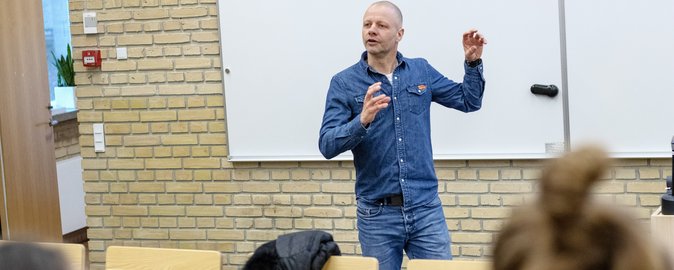- Education
-
Research
Current research
Talent
-
Collaboration
Businesses
Government agencies and institutions
Alumni
-
About AU
Organisation
Job at AU
Were you also one of the online participants who were left disappointed when the online connection crashed? Don't despair – here you can find the key conclusions from Tuesday's event on funding applications to the EU.
2021.12.02 |

How do you get a share of all the money for health research contained in the EU's key funding programme for research and innovation? Professor Martin Tolstrup from the Department of Clinical Medicine passed on his experience in relation to applying for funding from the EU. Photo: Line Rønn
On the last day of November, employees at Health could take part in an inspirational event full of good advice about how to apply for funding from the EU’s framework programme for research and innovation: Horizon Europe.
Unfortunately, the streaming of the event was affected by a technical failure, so only those present at the Aarhus Institute of Advanced Studies in the University Park had the opportunity to hear the presentations.
To make up for this, here you can read a summary of the most important points from the day – and please remember that you still have the opportunity to participate in three more inspirational events this year, which all aim to help both new and experienced researchers to apply for funding from the EU and the Innovation Fund Denmark. Everyone is welcome – also if you are just curious about what applying involves.
Applying to the Innovation Fund Denmark (Grand Solutions) - 2 December 15:00 - 16:00
Applying to ERC (Starting Grants and Consolidator Grants) - 7 December 15:00 - 16:00
Become a supervisor on Marie Curie Postdoctoral Fellowships - 8 December 15:00 - 16:00
Tuesday's information meeting was targeted at researchers who wish to participate in collaborative projects with partners from all over Europe.
The meeting focused on the challenges faced by applicants when it comes to taking part in consortium applications to the various clusters under the EU’s framework programme for research and innovation Horizon Europe, which has a staggering budget of EUR 95.5 billion until 2027.
Vice-Dean Hans Erik Bøtker first welcomed Associate Professor Ditte Demontis from the Department of Biomedicine. She conducts research into psychiatric genetics and is leading the genetics section of the major international research project TIMESPAN to promote understanding of the treatment of people with ADHD and comorbid cardiovascular disease. For the section of the project where she functions as a work package leader, she received an EU grant of DKK 2.2 million in 2021. In addition, she has joined two other EU consortia and is involved in another major EU application, which is still being processed.
The next presentation was by Professor Martin Tolstrup from the Department of Clinical Medicine. He is researching vaccines and antibody therapy and has been involved in three EU applications, one of which has received funding - a project to develop an RNA vaccine against HIV-1. He is the work package leader on the part of the project that profiles the immune response to samples from vaccinated people.
Both researchers emphasised that they were very happy to have a professional company involved from the beginning of the application process. The companies are specialists in large EU projects and in writing applications. They assist the writing process and are responsible for the project management, for example by ensuring that collaborative partners meet deadlines. The companies are often responsible for project management throughout the research project – in return for a certain percentage of the grant. Often the agreement is structured so that if the application does not receive funding, neither will the company receive payment.
Here is a brief summary of the 13 best points of advice from the two researchers for anyone planning to apply for funding from EU clusters:
Finally, Birgit Christensen held the research support office’s presentation.
Birgit Christensen, like the researchers, emphasized the value of networks, just as she stated that the topic texts must be read very thoroughly - something the Research Support Unit is happy to help with.
She drew attention to the fact that it is mandatory to get the Research Support Unit's approval of all EU budgets.
The two researchers have used external partners to handle the project management, but Birgit Christensen reminded that AU / AUH researchers can also get help from the Research Support Unit in the writing phase, just as you can hire an employee from the Research Support Unit to handle the administrative when a large EU project has received funding.
The research support unit holds regular courses and workshops – see them here.
Mark the date in your calendar, because there are still three inspirational events to come in 2021.
Read about them here:
______________________________________________________________________
2. december, kl. 15-16
______________________________________________________________________
Event: Applying to ERC (Starting Grants and Consolidator Grants)
7. december, kl. 15-16
______________________________________________________________________
Event: Become a supervisor on Marie Curie Postdoctoral Fellowships
8. december, kl. 15-16
______________________________________________________________________
Read more about the inspirational events here: Health News for Staff and Faculty (au.dk)